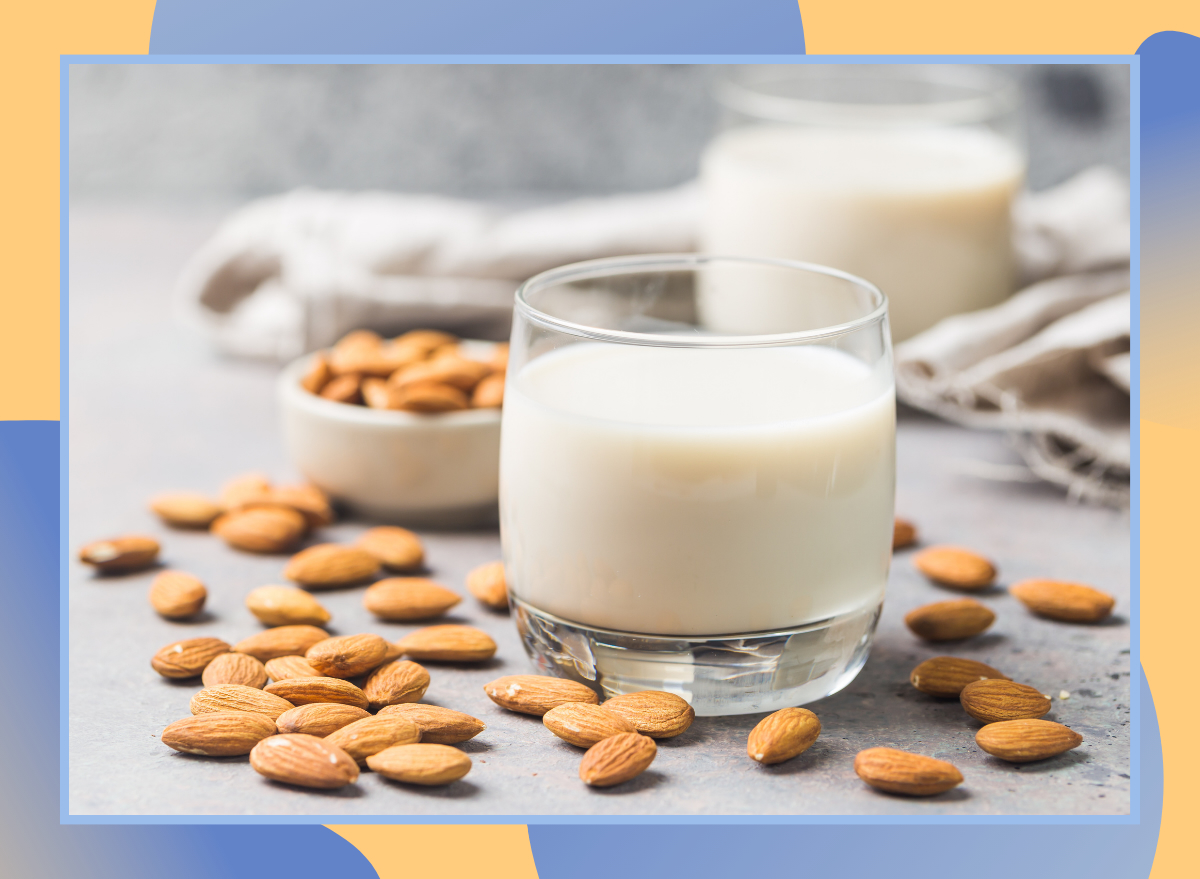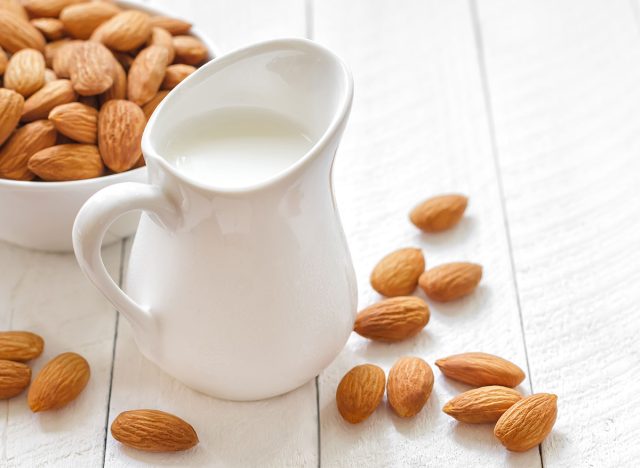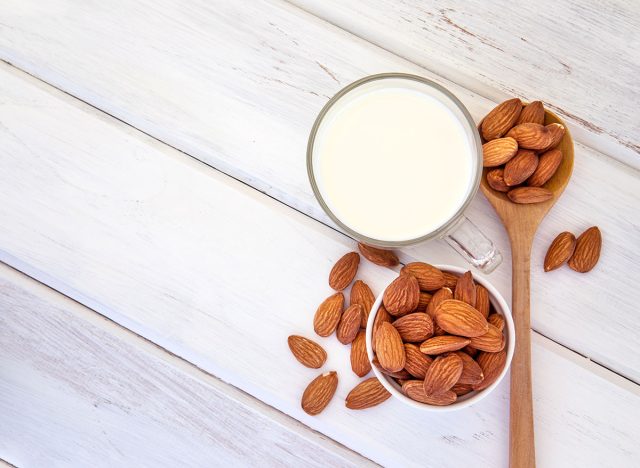Is Almond Milk Good For You? We Asked a Dietitian

Whether in the name of sustainability, health, or food intolerance, you’ll likely try plant-based milk alternatives, like almond milk, at one point. While there’s an almond milk option tailored to every dietary preference, some are more favorable than others, according to dietitians. And, as a dietitian myself, I would have to agree. For those almond milk consumers who need a bit more guidance on the pros and cons of adding it to your diet, we’ve got you covered. This article will explore the ingredients, nutritional profile, benefits, and potential drawbacks of consuming almond milk. After examining the evidence, the answer to whether almond milk is good for you is a bit nuanced, but generally, the answer is “yes.”
Read on to review the evidence, and for more on what you should be shopping for, check out The 11 Best Almond Milks To Buy, According to Dietitians.
What Ingredients Are In Almond Milk?

Almond milk’s ingredients (and nutrition facts) can vary quite a bit depending on the brand and variety purchased.
In its purest form, almond milk will contain only water and almonds. The bright side of this formulation is that there are no added sugars, fillers, preservatives, or other questionable ingredients. The downside is that it lacks fortification with important vitamins and minerals, like vitamins D, E, A, and calcium, often found in other milk products.
Now, there’s nothing wrong with almond milks containing ingredients outside almonds and water. In fact, I often recommend these to clients looking for a low-calorie alternative that still offers a creamy flavor to mix in smoothies or coffee and provides a little boost of vitamins and minerals along the way. However, almond milk is not equivalent to dairy milk or other plant-based milks, like soy milk, when it comes to protein and overall nutrient content. Let’s have a closer look at why.
Nutritional Profile of Almond Milk
Calories: 40
Fat: 2.5 g (Saturated fat: 0.2 g)
Sodium: 190 mg
Carbs: 3.4 g (Fiber: 0.5 g, Sugar: 2 g)
Protein: 1 g
In its most natural state, almond milk is made by soaking almonds in water, blending them together, then running the liquid through a cheesecloth to discard the thicker pieces. This creates a thin, creamy, milk-like consistency. Through this processing (and yes, this is technically processing even if you do it yourself at home), the protein and fiber content of the almonds are removed, leaving the consumer with a creamy, preferable flavor profile.
The result is low in calories but relatively low in other redeeming nutritional qualities unless the manufacturer fortifies their product. This means they would add a vitamin and mineral blend, or in some cases, a protein isolate, to increase the nutrition content. When this occurs, most almond milks achieve an excellent source (meaning over 20% of the daily value) for calcium, vitamin D, and vitamin E, and often a good source (meaning over 10% of the daily value) for other nutrients, like vitamin A.
However, while the most common fortification in almond milk varieties increases vitamins and minerals, this does not come close to the protein content in a cow’s milk or soy milk option. For instance, a 1-cup serving of low-fat cow’s milk contains 8 grams of high-quality protein and numerous vitamins and minerals, including calcium, potassium, vitamin D, and, in some cases, vitamin A. Similarly, soy milk prepared with solely water and soybeans contains 9 grams of protein in that same 1-cup portion. Plus, soy milk also packs 10% of the daily value for potassium (a nutrient commonly found to be under-consumed by Americans in the Dietary Guidelines for Americans.)
While this certainly doesn’t mean almond milk can’t be part of a healthy, balanced diet, it just means you have to consider the totality of your diet and what you’re using almond milk with to ensure you meet your nutrition needs for the day.
Health Benefits of Almond Milk

First, before we can talk about the health benefits of almond milk, you need to flip over the container and check the nutrition facts panel and ingredient statement. For brands fortified with additional vitamins and minerals, you can look forward to these additional health benefits! For instance, fortified, unsweetened almond milk is actually a great way to increase your intake of nutrients of public health concern many of us aren’t getting enough of, like vitamin D, calcium, and potassium. Deficiencies in vitamin D and calcium have been linked with poor bone health and can lead to an increased risk of fractures, especially with aging. Adding fortified almond milk into your diet can help increase your daily intake and may even get you to add a bit more fiber into your diet if you’re tossing it in a smoothie with high-fiber fruits and vegetables.
Almond milk fortified with vitamin E, an antioxidant naturally present in almonds but that loses some of its potency with processing, is also a wonderful health benefit when consuming almond milk. Research has shown vitamin E to aid in not only decreasing oxidation in the body (essentially, that’s kicking the bad guys out that enter your body over time through the environment or lifestyle choices) but can also help protect against certain diseases.
Potential Drawbacks of Almond Milk
The Dietary Guidelines for Americans stresses the importance of lowering added sugar intake in the American diet. Higher intakes of added sugar have been linked to weight gain, obesity, and other health complications. If you’re not careful about the almond milk variety you choose, you could end up with a 1-cup serving that packs nearly 4 teaspoons of added sugars (or roughly 17 grams.) According to the American Heart Association, that’s nearly 68% of the 25 grams of added sugars recommended per day.
Additionally, almond milk is not a suitable swap for young children with a dairy allergy. While moms may be looking for an alternative for their children that’s safe (believe me, I know; I too am one of those moms to a kid with a dairy allergy), kids need a nutrition profile that’s most similar to a cow’s milk for proper growth and development. Almond milk does not provide a good source of protein, even if fortified. Choosing a fortified, unsweetened soy or pea milk in this situation is a better alternative.
Is Almond Milk Healthy?

Yes and no. Unfortunately, the answer isn’t so black and white. Depending on your health goals, almond milk may be a great idea as part of a healthy idea. For instance, if your goals include weight loss, then choosing a lower-calorie milk alternative, like unsweetened, fortified almond milk, in your protein shakes is a smart swap. However, if your goals are to increase protein and put on some lean muscle mass, then you’re likely better off using a dairy milk that packs more protein and a bit more calories too.
At the end of the day, customized nutrition is key, and so is choosing the right milk (or milk alternative) to achieve your individualized goals. Thankfully, unless you’re allergic to almonds, there’s no downside in swapping almond milk into your recipes to create a lower-calorie end result. Just note that with those lower calories also comes a lower protein content. It mixes just like dairy milk would and can be a refreshing swap in your iced coffee during warmer months.
But, we’ll stress one more time that almond milks are not all created equally! So, be sure to pick up one of our dietitian-recommended picks based on your health needs. And, for a quick reference, as a dietitian and mom with weight-loss goals myself, I always keep an unsweetened, vanilla-flavored almond milk in my fridge at all times for quick additions to overnight oats, protein shakes, and muffins.
- Source: https://www.ncbi.nlm.nih.gov/pmc/articles/PMC7999853/
- Source: https://www.ncbi.nlm.nih.gov/pmc/articles/PMC5756203/
- Source: https://fdc.nal.usda.gov/fdc-app.html#/food-details/2340764/nutrients
- Source: https://www.dietaryguidelines.gov/resources/2020-2025-dietary-guidelines-online-materials/food-sources-select-nutrients
- Source: https://www.ncbi.nlm.nih.gov/pmc/articles/PMC3997530/
- Source: https://www.dietaryguidelines.gov/
- Source: https://www.heart.org/en/healthy-living/healthy-eating/eat-smart/sugar/added-sugars









